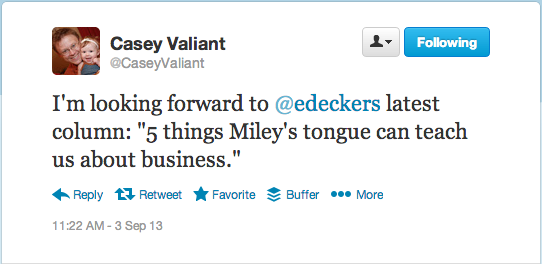My friend Casey jokingly challenged me to write this post:
After Miley’s R-rated performance at the MTV Video Music Awards (VMAs), including gratuitous tongue wagging and grinding on singer Robin Thicke, social media was ablaze with shocked reactions and stunned disbelief at what they had seen.
Of course, I’m never one to turn down a good “What _______’s tongue can teach” blog post, so I accepted the challenge.
There are a few business lessons, especially related to crisis communication, we can all learn from Miley Cyrus’ tongue.
Sort of.
1) Transparency and visibility are not always highly valued.
There is such a thing as too much transparency. Don’t air the company’s dirty laundry just because you think you should. Which leads us to. . .
2) Just because you can doesn’t mean you should.
We hear about the PR stunts and the corporate jackassery all too often in the business pages, and we read with the appropriate amount of shock and horror. And that should clue you in that PR stunts backfire, and jackassery, well, is not looked kindly upon by most people.
This means that while some things may be legal, that doesn’t mean they’re right — looking at YOU, Wall Street!
3) When your actions get in the way of your message, rethink your plan.
My oldest daughter used to love Hannah Montana, and I will grudgingly admit that she has a modicum of talent (“he mumbled curmudgeonly”). Which, I assume, is why she was invited to the VMAs in the first place. But I couldn’t even tell you whether she sang that night, or what song she did sing. And I’m willing to bet that in 10 years, no one will remember the song, but they’ll remember her performance.
Do I really need to draw this particular analogy out for you? Don’t do stupid stuff.
4) If you’re going to screw up, you’d better have a plan for recovery.
In a recent interview, Miley cited Madonna and Britney Spears as positive role models other singers who have made, um, questionable decisions about performances, and she pointed out that people forgot all about it.
Eventually.
Of course, you have to have a lot of star power to pull off a “screw you, I don’t care” recovery plan successfully. For the rest of us, you need to work on containment and recovery. You need to work on overcoming the issue. Don’t hide from it, don’t deny it, don’t pretend it didn’t happen. The road to business failure is paved with bad PR advice.
Just cop to the problem, admit it, apologize, and move on. Assuming your problem isn’t legal or going to see you in court/jail, just shrug it off and promise to do better.
5) When that’s not even the worst thing people are discussing, you’ve got bigger problems.
All the photos I’ve seen of Miley are of her tongue sticking way out of her head. Not all of them are of her grinding on Beetlejuice, but they are all of her and her tongue. And yet that’s not what people are talking about. When every photo is of your tongue, and yet that’s not even the elephant in the room — though, given its size, it does give the elephant’s trunk a run for its money — then you have a problem.
Don’t lose your small problems in your bigger problems. If you’re going through a crisis with your company, you still have to focus on the smaller problems at the same time: deliveries, customer service, sales, etc. You don’t shut down. You don’t assume that your customers will give you a pass. You take care of business and deal with the crisis at the same time.
